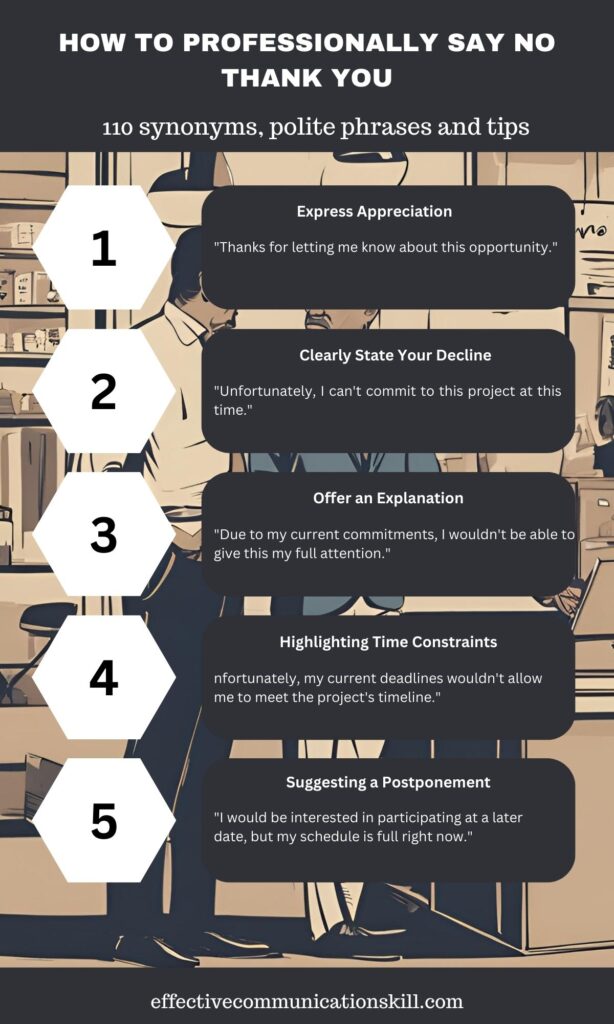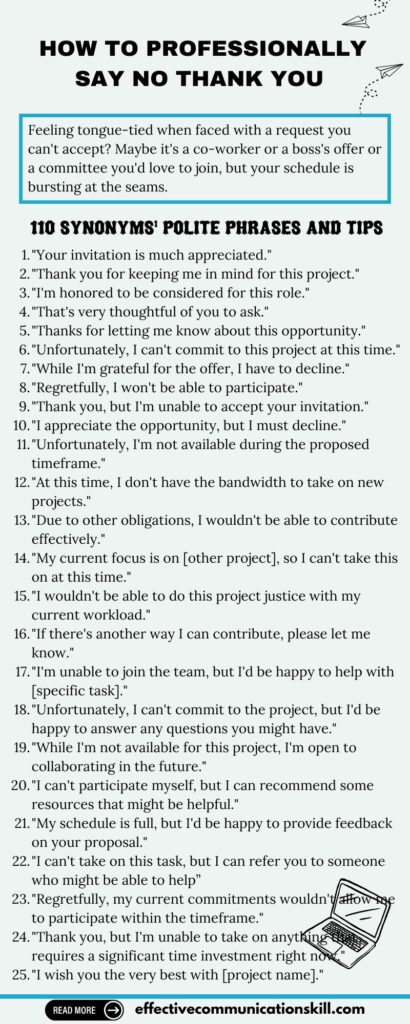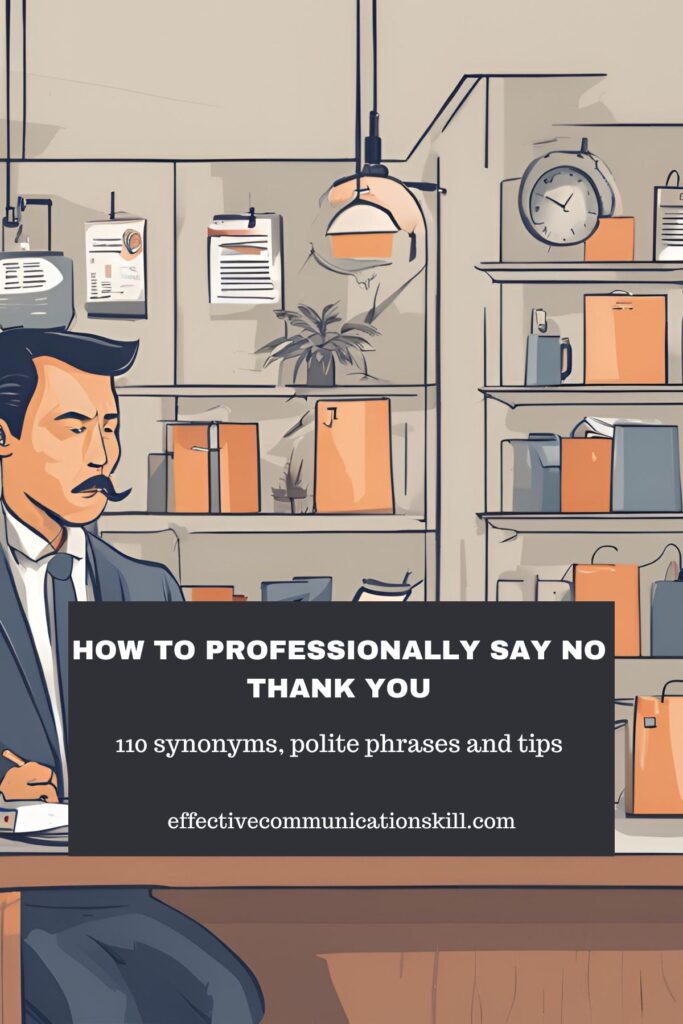How to Professionally Say No Thank You
Feeling tongue-tied when faced with a request you can’t accept? Maybe it’s a co-worker or a boss’s offer or a committee you’d love to join, but your schedule is bursting at the seams.
Perhaps a new project sounds exciting, but it doesn’t quite align with your current goals. Whatever the reason, mastering the art of saying “no” is a crucial professional skill. How to Professionally Say It’s None of Your Business – It allows you to manage your workload effectively, prioritize your commitments, and ultimately, perform at your best.
This guide will equip you with the tools and phrases you need to navigate these situations confidently and professionally. So, ditch the awkward silence and learn to gracefully decline while leaving a positive impression.

How to Professionally Say No Thank You
There are several ways to politely decline a request while maintaining a positive and professional tone. Here are five effective strategies to say no thank you in a formal way:
- Express Appreciation: Begin by acknowledging the offer and expressing your gratitude. “Thank you for thinking of me for this project.”
- Clearly State Your Decline: Be clear and concise in your refusal. “Unfortunately, I won’t be able to participate this time.”
- Offer an Explanation (Optional): Briefly explain your reasoning without going into excessive detail. “My current workload wouldn’t allow me to dedicate the necessary time.”
- Suggest an Alternative (Optional): If possible, propose a different solution or offer to help in another way. “Perhaps I can recommend a colleague who might be a better fit.”
- End on a Positive Note: Reiterate your appreciation and express well wishes for the project’s success. “I wish you all the best with this initiative.”
100+ Ways to Professionally Say No Thank You
Here’s a comprehensive list of other ways to say no thank you in a professional way:
Express Appreciation:
- “Thank you for considering me for this project.”
- “I appreciate you thinking of me for this opportunity.”
- “That’s very kind of you to offer me a spot on the team.”
- “I’m grateful you thought of me for this important task.”
- “Thanks for reaching out about this exciting initiative.”
- “I truly appreciate you including me in your plans.”
- “Your invitation is much appreciated.”
- “Thank you for keeping me in mind for this project.”
- “I’m honored to be considered for this role.”
- “That’s very thoughtful of you to ask.”
- “Thanks for letting me know about this opportunity.”
Clearly State Your Decline:
- “Unfortunately, I won’t be able to participate this time.”
- “I regret that I must decline your offer.”
- “I’m afraid I won’t be able to take this on at this moment.”
- “It wouldn’t be possible for me to join the project right now.”
- “Thank you, but I’ll have to respectfully decline.”
- “I appreciate the invitation, but I must decline.”
- “Unfortunately, I can’t commit to this project at this time.”
- “While I’m grateful for the offer, I have to decline.”
- “Regretfully, I won’t be able to participate.”
- “Thank you, but I’m unable to accept your invitation.”
- “I appreciate the opportunity, but I must decline.”
Offer an Explanation:
- “My current workload wouldn’t allow me to dedicate the necessary time.”
- “I don’t have the capacity to take on additional commitments right now.”
- “Unfortunately, I lack the specific expertise required for this task.”
- “Due to my current commitments, I wouldn’t be able to give this my full attention.”
- “I have scheduling conflicts that would prevent me from participating fully.”
- “My current priorities wouldn’t allow me to excel in this role.”
- “Unfortunately, I’m not available during the proposed timeframe.”
- “At this time, I don’t have the bandwidth to take on new projects.”
- “Due to other obligations, I wouldn’t be able to contribute effectively.”
- “My current focus is on [other project], so I can’t take this on at this time.”
- “I wouldn’t be able to do this project justice with my current workload.”
Suggest an Alternative (Optional):
- “Perhaps [colleague’s name] would be a better fit for this project.”
- “I’d be happy to connect you with someone who might be able to assist.”
- “While I can’t participate myself, I’d be happy to offer some feedback on [specific aspect].”
- “If there’s another way I can contribute, please let me know.”
- “I’m unable to join the team, but I’d be happy to help with [specific task].”
- “Unfortunately, I can’t commit to the project, but I’d be happy to answer any questions you might have.”
- “While I’m not available for this project, I’m open to collaborating in the future.”
- “I can’t participate myself, but I can recommend some resources that might be helpful.”
- “My schedule is full, but I’d be happy to provide feedback on your proposal.”
- “I can’t take on this task, but I can refer you to someone who might be able to help”
Highlighting Time Constraints:
- “Unfortunately, my current deadlines wouldn’t allow me to meet the project’s timeline.”
- “I wouldn’t be able to dedicate the time this project requires right now.”
- “Due to a busy schedule, I wouldn’t be able to fully commit to this at this time.”
- “I have limited availability in the coming weeks, making it difficult to participate.”
- “My calendar is quite full at the moment, and I wouldn’t be able to give this my full attention.”
- “With my current workload, I wouldn’t be able to meet the expected time commitment.”
- “Unfortunately, I’m facing a time crunch and wouldn’t be able to contribute effectively.”
- “Due to upcoming deadlines, I wouldn’t be able to manage the additional workload.”
- “I have a tight schedule in the foreseeable future, which limits my availability.”
- “Regretfully, my current commitments wouldn’t allow me to participate within the timeframe.”
- “Thank you, but I’m unable to take on anything that requires a significant time investment right now.”
Expressing Conflicting Priorities:
- “Unfortunately, my current priorities wouldn’t allow me to take this on at this time.”
- “I have other commitments that require my focus at the moment.”
- “My current workload requires me to prioritize other projects right now.”
- “Due to my existing commitments, I wouldn’t be able to dedicate the necessary attention to this opportunity.”
- “Thank you, but I have other pressing deadlines that I need to focus on.”
- “I appreciate the offer, but I have other projects that require my immediate attention.”
- “Unfortunately, this wouldn’t align with my current priorities.”
- “At this time, I have other commitments that demand my focus.”
- “While this is an interesting project, it doesn’t align with my current priorities.”
- “Thank you, but I must prioritize completing my current projects before taking on anything new.”
- “I appreciate the opportunity, but I have other strategic goals I’m currently pursuing.”
Suggesting a Postponement:
- “I would be interested in participating at a later date, but my schedule is full right now.”
- “Perhaps this is something we could revisit in the future when my schedule is less demanding.”
- “I’d love to be involved, but I wouldn’t be able to give this my full attention at this time. Would it be possible to revisit this later?”
- “Thank you for the offer. While I can’t commit right now, I’d be happy to discuss this again in the future if my schedule allows.”
- “I appreciate the opportunity, but I’m swamped right now. Would it be alright to circle back in a few weeks?”
- “Unfortunately, I’m unable to participate at this moment. However, I’d be happy to consider it if the opportunity arises again in the future.”
- “While I can’t commit right now, I’m open to discussing this possibility at a later date.”
- “Thank you for thinking of me. Due to my current workload, I wouldn’t be able to do this justice. Perhaps we can revisit this in the future?”
- “I’m afraid I’m unavailable at this time. However, please keep me in mind for future opportunities that align with my schedule.”
- “I appreciate the offer, but I must decline for now. If the project timeline allows, I’d be happy to revisit this possibility later.”
- “Unfortunately, I can’t take this on right now. However, I’d be glad to help if the project continues in the future.”
End on a Positive Note:
- “I wish you the very best with [project name].”
- “Please keep me in mind for future opportunities that align with my goals.”
- “I look forward to collaborating on future projects when my schedule allows.”
- “I truly appreciate you understanding.”
- “Best of luck with [project name] – I’m sure it will be a success!”
- “Thank you again for thinking of me. I wish you all the best.”
- “Please let me know if there’s anything else I can do to support this initiative.”
How to Professionally Say Thanks But No Thanks
- Thanks, but I have a prior commitment that day.
- I appreciate the offer, but I’m not available at this time.
- Thank you, but I’m not the right person for this task.
- Thanks, but I’m currently focusing on [other project].
- I appreciate it, but I’ll have to decline for now.
Thanks for reaching out, but this isn’t quite the right fit for me at the moment. - I truly appreciate you thinking of me, but I must decline.
- That sounds interesting, but unfortunately, I have to pass.
- While I’m grateful for the offer, I’m going to have to say no this time.
- Thank you, but my schedule wouldn’t allow me to do this justice.

How to Say No to an Opportunity Politely
- Unfortunately, this opportunity doesn’t align with my current goals.
- I appreciate the offer, but I must decline due to [brief explanation].
- Thank you, but I’m not looking for new opportunities at this time.
- I’m grateful for the offer, but I have to decline respectfully.
- Thank you for considering me, but I’ve decided to pursue a different path.
- I appreciate you reaching out, but unfortunately, this opportunity doesn’t align with my current career goals.
- Thank you for offering this exciting opportunity, but I must decline at this time.
- While this sounds like a great project, I have to respectfully decline due to [brief explanation].
- I’m honored to be considered, but I’ve recently accepted another position.
- Thank you for your time and consideration, but I won’t be able to participate in this opportunity.
Examples in Action
Here are some scenarios demonstrating how to effectively decline a request while maintaining professionalism:
Scenario 1: Lack of Expertise
Subject: Re: Project on [Topic]
Dear Michael,
Thank you for reaching out about the upcoming project on [topic]. I appreciate you thinking of me. Unfortunately, I don’t have the specific expertise required for this task, particularly in [mention specific skill or knowledge needed].
However, I’d be happy to connect you with [colleague’s name] who has extensive experience in this area. I’m confident they would be a valuable asset to the project.
Best regards,
[Your Name]
Scenario 2: Conflicting Priorities
Subject: Re: Meeting Invitation
Dear Jessica,
Thank you for the invitation to the meeting on [topic]. Unfortunately, due to a prior commitment related to [mention ongoing project], I won’t be able to attend.
Would it be possible to receive a recording or summary of the key points discussed? Additionally, if there are any actionable items that I can contribute to remotely, please let me know.
Best regards,
[Your Name]
Scenario 3: Declining an Opportunity (New Position)
Subject: Re: Job Offer – [Position Name]
Dear Mr. Jones,
Thank you very much for offering me the [position name] position at [company name]. I truly appreciate you taking the time to interview me and consider me for this opportunity.
After careful consideration, I’ve decided to decline the offer at this time. This decision was not an easy one, and I was very impressed with [mention something positive about the company or position]. However, I’ve chosen to pursue another opportunity that aligns more closely with my current career goals.
I wish you all the best in your search for the perfect candidate.
Thank you again for your time and consideration.
Sincerely,
[Your Name]
Scenario 4: Declining an Opportunity (Event Participation)
Subject: Re: Invitation to Speak at [Event Name]
Dear Ms. Smith,
Thank you for inviting me to speak at the upcoming [event name] conference. I’m honored to be considered and I appreciate you thinking of me.
Unfortunately, due to scheduling conflicts, I won’t be able to participate in this year’s event.
I would be interested in the possibility of speaking at a future event, however. Please keep me in mind for upcoming conferences, and feel free to reach out if you have any questions.
Thank you again for the invitation.
Sincerely,
[Your Name]
Scenario 5: Declining Due to Lack of Interest
Subject: Re: Participation in [Project Name]
Dear Daniel,
Thank you for inviting me to participate in the [project name] project. I appreciate you keeping me in mind.
After reviewing the project details, I must politely decline. The project focus on [mention specific aspect] doesn’t quite align with my current interests. I’m currently more passionate about [mention your current area of interest].
I wish you and the team all the best with this project. Please don’t hesitate to reach out if you have any questions.
Best regards,
[Your Name]
Scenario 6: Time Constraints (Short Notice)
Subject: Re: Urgent Request – [Task Name]
Dear Olivia,
Thank you for reaching out about the urgent need for [task name]. Unfortunately, due to the short notice and my current deadlines, I wouldn’t be able to complete this task to the high standard I strive for.
Would it be possible to [suggest an alternative solution]? Perhaps another team member might have the availability to take this on, or if the deadline can be adjusted slightly, I might be able to assist.
Please let me know how I can best support you in this situation.
Best regards,
[Your Name]
Scenario 7: Offering to Help in a Different Way
Subject: Request for Assistance with [Task Name]
Dear William,
Thank you for thinking of me for your assistance with [task name]. While I’m currently swamped with [mention ongoing project] and wouldn’t be able to dedicate the necessary time myself, I’d be happy to help in another way.
Would you be interested in [suggesting alternative ways to help]? Perhaps I can connect you with a colleague who has expertise in this area, or I could offer some feedback on [specific aspects] if that would be helpful.
Please let me know how I can best assist you.
Best regards,
[Your Name]

Conclusion
Mastering the art of “no” is a superpower in the professional world. It empowers you to manage your workload, prioritize your goals, and ultimately, excel in your career. By utilizing the strategies and examples in this guide, you can deliver clear and polite declines that leave a positive impression.
Remember, a well-crafted “no” demonstrates your professionalism, respect for others’ time, and sets you up for future success. So go forth, conquer your workload, and say “no” with confidence!
